
Johns Hopkins UniversityEst. 1876
America’s First Research University
Featured Readings on Democracy

On Democracy
Hopkins Press is dedicated to publishing and disseminating information on the importance of preserving democracy. Explore our rich catalog of academic resources on the study of democracy below. These texts offer rigorous scholarship that engages with the complexities and evolving challenges of democratic systems worldwide. This collection is designed to support scholars, researchers, and students in advancing critical discourse and understanding of democratic theory, practice, and history. Featuring works by leading academics, these texts explore the philosophical underpinnings, institutional frameworks, and sociopolitical dynamics that define democracy in various contexts.
Select Books on Democracy
Recent Articles from Hopkins Press Journals
FROM JOURNAL OF DEMOCRACY
Who Decides What Is Democratic?
Adam Przeworski
Journal of Democracy, Vol. 35, No. 3, July 2024
The Future of Multiracial Democracy: Majoritarianism Without Majorities
Kanchan Chandra
Journal of Democracy, Vol. 35, No. 4, October 2024
Misunderstanding Democratic Backsliding
Thomas Carothers and Brendan Hartnett
Journal of Democracy, Vol. 35, No. 3, July 2024
ACROSS THE REST OF OUR CATALOG
Steven Levitsky on the Global State of Democracy and the Future of Authoritarianism in the United States
Steven Levitsky
Georgetown Journal of International Affairs, Vol. 1, No. 1, Summer 2024
Can Democracy Be Saved by Economic Policy?: The Burden of Bidenomics
Hans Kundnani and William Milberg
Social Research: An International Quarterly, Vol. 91, No. 3, Fall 2024
When Democracy Brings Insecurity: The Political Legacies of Regime Change
Hans Lueders
World Politics, Vol. 76, No. 1, January 2024
For Democratic Governance of Universities: The Case for Administrative Abolition
Blanca Missé and James Martel
Theory & Event, Vol. 27, No. 1, January 2024
Liberalizing in Confidence: From Development to Democracy and Authoritarian-Led Democratization in Asia
Ja Ian Chong
Asian Perspective, Vol. 48, No. 3, Summer 2024
Gasping for Breath: Democracy à bout de souffle?
Rosemarie Scullion
SubStance, Vol. 52, No. 1, 2023 (Issue 160)
Concept Misformation in the Age of Democratic Anxiety: Recent Temptations and Their Downsides
Kurt Weyland
World Politics, Vol. 76, No. 3, July 2024
Unanimous Gods, Unanimous Athens: The Oresteia's Challenge to Democracy
Amit Shilo
Arethusa, Vol. 56, No. 1, Winter 2023
More Beautiful than Democracy: Toni Morrison and the Idea of a Shareable World
Lawrie Balfour
Theory & Event, Vol. 27, No. 1, January 2024
Democracy, “Democracy (Reprise),” and the Asian American Ambivalence of Soft Power
Donatella Galella
Theatre Journal, Vol. 76, No. 1, March 2024
Peter Michael Martin's Corporeal Visions: Love, Death, and Democracy in Moby-Dick
David L. Rosenthal
Leviathan, Vol. 25, No. 3, October 2023
Sacraments, Veils, and the Altar of Democracy: Calvinist Rhetoric in W.E.B. Du Bois’s The Souls of Black Folk and Nathaniel Hawthorne’s “The Minister’s Black Veil”
Christopher Leise
Christianity & Literature, Vol. 73, No. 3, September 2024
Open Access Selections from Project MUSE

Democracy and the Media: The Year in C-Span Archives Research, Volume 7
Volume 7 of The Year in C-SPAN Archives Research series focuses on the relationship between democracy and the media. Using the extensive collection of the C-SPAN Video Library, chapters cover Trump political rallies, congressional references of late-night comedy, responses of African American congresswomen to COVID-19 bills, and congressional attacks on the media through floor speeches in the House of Representatives and Senate. The C-SPAN Video Library is unique because there is no other research collection that is based on video research of contemporary politics. Methodologically distinctive, much of the research uses new techniques to analyze video, text, and spoken words of political leaders. No other book examines such a wide range of topics―from immigration to climate change to race relations―using video as the basis for research.
 After The War on Crime: Race, Democracy, and a New Reconstruction
After The War on Crime: Race, Democracy, and a New Reconstruction
Since the 1970s, Americans have witnessed a pyrrhic war on crime, with sobering numbers at once chilling and cautionary. Our imprisoned population has increased five-fold, with a commensurate spike in fiscal costs that many now see as unsupportable into the future. As American society confronts a multitude of new challenges ranging from terrorism to the disappearance of middle-class jobs to global warming, the war on crime may be up for reconsideration for the first time in a generation or more. Relatively low crime rates indicate that the public mood may be swinging toward declaring victory and moving on.
However, to declare that the war is over is dangerous and inaccurate, and After the War on Crime reveals that the impact of this war reaches far beyond statistics; simply moving on is impossible.
 Destroying Democracy: Neoliberal capitalism and the rise of authoritarian politics
Destroying Democracy: Neoliberal capitalism and the rise of authoritarian politics
Democracy is being destroyed. This is a crisis that expresses itself in the rising authoritarianism visible in divisive and exclusionary politics, populist political parties and movements, increased distrust in fact-based information and news, and the withering accountability of state institutions. Over the last four decades, democracy has radically shifted to a market democracy in which all aspects of human, non-human and planetary life are commodified, with corporations becoming more powerful than states and their citizens. This is how neoliberal capitalism functions at a systemic level and if left unchecked, is the greatest threat to democracy and a sustainable planet.
 Christianity, Democracy, and the Shadow of Constantine
Christianity, Democracy, and the Shadow of Constantine
The collapse of communism in Eastern Europe has forced traditionally Eastern Orthodox countries to consider the relationship between Christianity and liberal democracy. Contributors examine the influence of Constantinianism in both the post-communist Orthodox world and in Western political theology. Constructive theological essays feature Catholic and Protestant theologians reflecting on the relationship between Christianity and democracy, as well as Orthodox theologians reflecting on their tradition’s relationship to liberal democracy. The essays explore prospects of a distinctively Christian politics in a post-communist, post-Constantinian age.
Find More Open Access books on Democracy




















